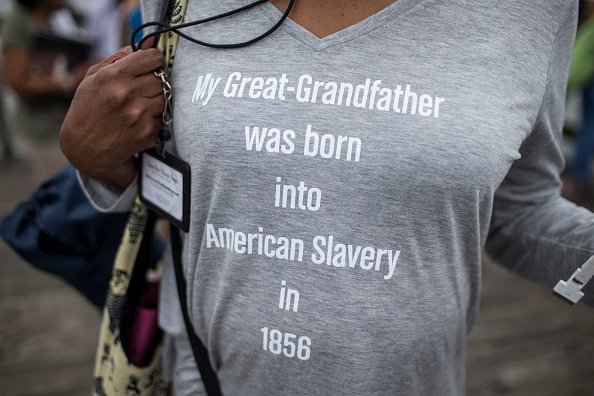
Content Warning: This post references racist violence in history and present-day settings.
In our current climate, there are voices that are implying that the need to talk about the sins of the past is preventing us from moving forward. Politicians would lead us to believe that if we stay focused on the future, the past can stay buried. The use of distraction and misdirection misleads us down the path of blind acceptance of the passive eradication of our very existence. We, people of color, are being erased. In the generations to come, it may be the role of parents to teach their children who they are and where they come from … but a person cannot teach what they do not know.
Politicians would lead us to believe that if we stay focused on the future, the past can stay buried. The use of distraction misleads us down the path of blind acceptance of the passive eradication of our very existence. Share on XThe strategy of hiding history, then rewriting history, and ultimately erasing history is nothing new. The argument of white discomfort can no longer be allowed to overshadow the discomfort that is the daily existence of BIPOC people in this country. The reality is that until we talk about it, nothing will change. We must acknowledge the mistakes that we have made in order to get out of these cycles of oppression and move toward a better future.
The strategy of hiding history, rewriting it, and erasing it is nothing new. The argument of white discomfort can no longer be allowed to overshadow the discomfort that is the daily existence of BIPOC people in this country. Share on XThe reality is that this country was built on this notion that Black and Brown people were inferior and therefore, insignificant. As much as they want us to forget, here’s a brief history lesson:
In early American history, those deemed inferior were American Indians. As colonization progressed, they were massacred, imprisoned, and relocated. Their land was taken from them, their resources depleted, and the very ground they cultivated claimed as property of the other. It didn’t matter if the fight was fair, only that it was won. Today, very little is taught or understood about American Indians, and stereotypes continue to be passed off as fact. A proud people with a rich culture have been diminished to caricatures. America’s attempts at reparations (waiving taxes, free college, protected lands) are all small steps up a very steep mountain.
Then in 1619, Africans became the more conveniently oppressed. Stolen from their homes and families, unfamiliar with their surroundings, African people were viewed as chattel and never equals; seen as nonhuman in the eyes of the oppressor, “animals” who were meant to stay in their place. Yet, any being with the capacity to think will outgrow their willingness to comply. Truth be told, these people, perceived by their oppressors as “savages” were always plotting a means of escape.
This country was built on the backs of some of the most resilient people on the planet, yet their oppressors were appalled by their belief that they deserved more. Everything was done to destroy their spirits. They were stripped of their dignity, had their children taken from them, were raped, lynched, and brutalized. Yet, somehow, some still saw hope in the words of the Constitution, believing that one day America would see them as equals. They never asked to come here like immigrants; they were stolen and brought to these shores without consideration. White society decided that the color of their skin made them the lesser, made them animals. So, enslaved people took their reasonable arguments to unreasonable people, and even after they fought their way out of slavery, it took another 100 years before something resembling sensibility allowed them to gain more freedoms.
This country was built on the backs of some of the most resilient people on the planet, yet their oppressors were appalled by their belief that they deserved more. Everything was done to destroy their spirits. Share on XEven still, we grapple with the pain of the past and racism is no less present today than it was 60 years ago, before the passage of the Civil Rights Act of 1964. Now as it was then, African Americans are reminded of their place and as recent events continue to demonstrate, may meet tragic ends if they dare cross that line. The problem will be dealt with swiftly and unapologetically. Yet some voices say, “If we don’t talk about it, don’t teach it, don’t keep it real, it will just go away.”
There are so many critical history lessons that have been skipped, hidden, or erased because they make white people uncomfortable … yet it is in our discomfort that we grow. Not teaching hard history allows history to be rewritten, allowing a culture to all but disappear. If this is the plan, it is working.
There are so many critical history lessons that have been skipped, hidden, or erased because they make white people uncomfortable … yet it is in our discomfort that we grow. Share on XSo many of our Black and Brown communities are in an identity crisis, unable to rely on education for answers. They do not know who they are or where they come from, because our society is buying into the lie that not knowing is better than being uncomfortable, that majority comfort is more important than others’ discomfort. The truth is that learning about the experiences of others benefits everyone. It is not our children that are uncomfortable with the truth; it is the adults.
Our society is buying into the lie that not knowing is better than being uncomfortable, that majority comfort is more important than others’ discomfort. The truth is that learning about the experiences of others benefits everyone. Share on XThis is why nothing changes — because decisions are not made based on what is best for our future, but rather based on what is best for our present and our past. This has been the way since colonists landed on these shores. They chose to forget why they came and picked up the very traits of their oppressors, oppressing others. They did not allow their past to make them better, did not choose to learn from what was done to them, but rather perpetuated the examples of their forefathers.
This is why nothing changes — because decisions are not made based on what is best for our future, but rather what is best for our present and past. This has been the way since colonists landed on these shores. Share on XNow here we stand, taking the same test and failing it once again by choosing the same answers. How many times must we go around this mountain before we realize that there is a better way? The future of diversity, equity, and inclusion is at stake, because if we continue down this path, no one will be allowed to do what is best for people, both young and old. The bottom line is that avoidance is not the answer, and if we fail to wake up, we are being sleepwalked to our demise.

















